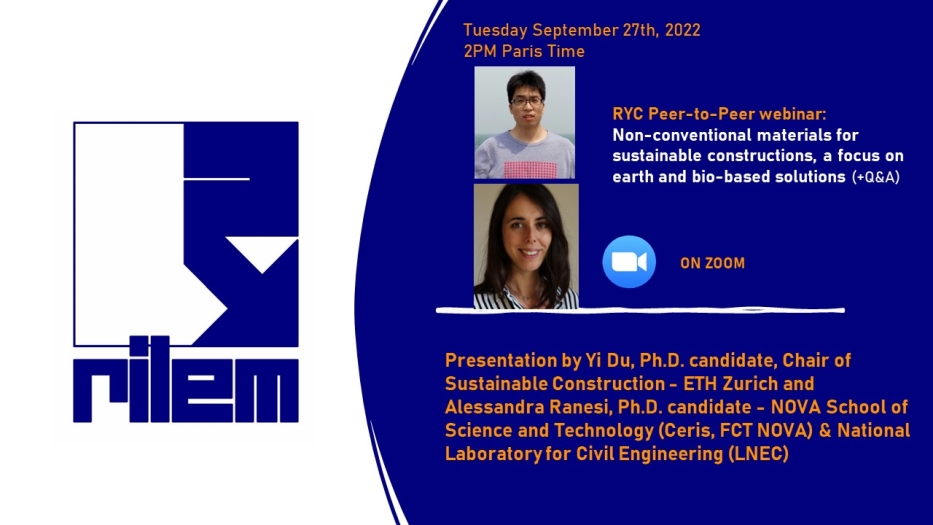Events calendar
Region : Europe

RYC Peer-to-Peer webinar: Non-conventional materials for sustainable constructions, a focus on earth and bio-based solutions
The next Peer-to-Peer webinar will take place on Tuesday September 27th, 2022 at 2PM Paris Time and will be one hour long (2*20 minutes presentations + 10-minute interaction). The registration for this webinar is free.
Theme of the Peer-to-Peer Webinar: Non-conventional materials for sustainable constructions, a focus on earth and bio-based solutions.
REGISTER FOR FREE HERE.
Speaker 1: Yi Du, Ph.D. candidate, Chair of Sustainable Construction - ETH Zurich
Title: A new low-carbon clay concrete with improved water resistance
Without transport and with infinite recycling possibilities, earth is one of the most local and available construction materials with the lowest environmental impact. It represents the best example of a closed material flow loop: from the excavation site to construction elements. However, despite the numerous advantages of earth, its mass application as a mainstream construction material is hindered by the time required to build with it, its low strength, and its high water sensitivity.
Poured earth, or self-compacting earth concrete, was developed with the intention to solve the time-consuming and labor-intensive characteristics of earth construction. Similar to concrete, but with a lower amount to no cement incorporated, it can be cast directly into the mould thanks to its good workability, and it then gradually solidifies and sets. This similarity to concrete ensures poured earth could share the existing production facilities, making it more attractive to adopt into the current construction industry as it requires no change of stakeholder along the value chain nor additional infrastructure investments for construction actors. However, the development of poured earth is still in its infancy, and few design options have been reported.
With the aim to enlarge the poured earth choices meanwhile, to endow it with improved water resistance in a more environmentally friendly way, in this talk, we will present a new type of poured earth based on natural tannin extracts and iron compounds. Tannin is used as a dispersant to liquefy clay materials, while the iron compound act as an anti-tannin agent to slowly remove the dispersing effect and re-coagulate clay. The effect of iron compounds with different solubility on the reaction kinetics and coagulation process will be presented. In addition, the variations of tannins in terms of sources and structure will be addressed, as well as the water protection mechanisms. The outcomes of this work could promote the development of earth materials, ultimately reducing the construction industry’s environmental impact, and making the industry develop toward a more sustainable direction.
Speaker 2: Alessandra Ranesi, Ph.D. candidate - NOVA School of Science and Technology (Ceris, FCT NOVA) & National Laboratory for Civil Engineering (LNEC)
Title: Enhancing hygroscopic behaviour of gypsum plastering mortars: the addition of Acacia dealbata
Plastering mortars can play a significant role on the indoor comfort, due to the large surface of interior walls and ceilings they cover. An important function plasters can address to improve the occupants’ comfort is to reduce the fluctuation of relative humidity (RH) through a passive regulation, adsorbing and releasing moisture from the air.
The hygroscopic behaviour of several plastering mortars has been investigated and clayish earth plasters were found the most hygroscopic, according to static as much as dynamic determination. The gypsum plaster, instead, was found to have a very high water vapour permeability (that leads to a high moisture penetration depth) but a low hygroscopicity and moisture buffer ability. Nevertheless, gypsum plasters are very spread in some European Countries such as Portugal, have a high compatibility with historical buildings and are eco-efficient compared to lime and cement plasters. For the latter reasons a study to improve hygroscopicity started.
An agro-industrial bio-based waste was selected to be added to a premixed gypsum plastering mortar with the aim of enhancing its hygroscopic behaviour. Acacia dealbata is an invasive Australian specie nowadays spread all-over the world. Five different fractions of this plant (flowers, wood, leaves, branchlets and barks) were added (5% and 10% vol.) to gypsum mortar after extractives recovery (for cosmetic and pharmaceutical industry). The fresh and hardened state of the modified mortars were characterized. The present talk will discuss pros and cons of the bio-based solutions chosen for this still ongoing work.
No comment
Log in to post comment. Log in.





